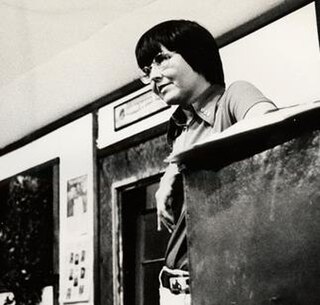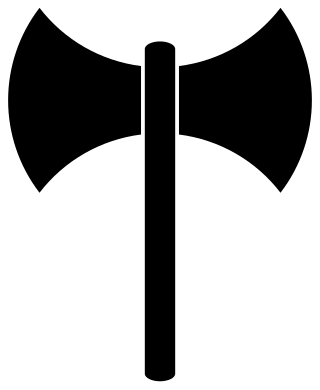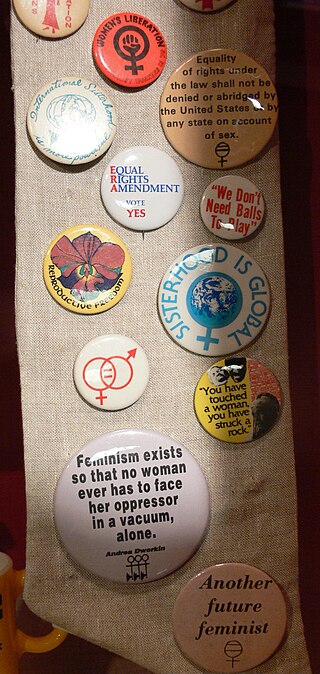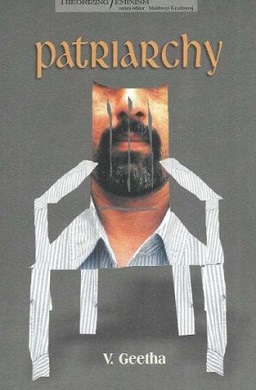Related Research Articles
Feminism is a range of socio-political movements and ideologies that aim to define and establish the political, economic, personal, and social equality of the sexes. Feminism holds the position that societies prioritize the male point of view and that women are treated unjustly in these societies. Efforts to change this include fighting against gender stereotypes and improving educational, professional, and interpersonal opportunities and outcomes for women.
Radical feminism is a perspective within feminism that calls for a radical re-ordering of society in which male supremacy is eliminated in all social and economic contexts, while recognizing that women's experiences are also affected by other social divisions such as in race, class, and sexual orientation. The ideology and movement emerged in the 1960s.
Feminist literary criticism is literary criticism informed by feminist theory, or more broadly, by the politics of feminism. It uses the principles and ideology of feminism to critique the language of literature. This school of thought seeks to analyze and describe the ways in which literature portrays the narrative of male domination by exploring the economic, social, political, and psychological forces embedded within literature. This way of thinking and criticizing works can be said to have changed the way literary texts are viewed and studied, as well as changing and expanding the canon of what is commonly taught. It is used a lot in Greek myths.

Mary Daly was an American radical feminist philosopher and theologian. Daly, who described herself as a "radical lesbian feminist", taught at the Jesuit-run Boston College for 33 years. Once a practicing Roman Catholic, she had disavowed Christianity by the early 1970s. Daly retired from Boston College in 1999, after violating university policy by refusing to allow male students in her advanced women's studies classes. She allowed male students in her introductory class and privately tutored those who wanted to take advanced classes.

Lesbian feminism is a cultural movement and critical perspective that encourages women to focus their efforts, attentions, relationships, and activities towards their fellow women rather than men, and often advocates lesbianism as the logical result of feminism. Lesbian feminism was most influential in the 1970s and early 1980s, primarily in North America and Western Europe, but began in the late 1960s and arose out of dissatisfaction with the New Left, the Campaign for Homosexual Equality, sexism within the gay liberation movement, and homophobia within popular women's movements at the time. Many of the supporters of Lesbianism were actually women involved in gay liberation who were tired of the sexism and centering of gay men within the community and lesbian women in the mainstream women's movement who were tired of the homophobia involved in it.
Feminist history refers to the re-reading of history from a woman’s perspective. It is not the same as the history of feminism, which outlines the origins and evolution of the feminist movement. It also differs from women's history, which focuses on the role of women in historical events. The goal of feminist history is to explore and illuminate the female viewpoint of history through rediscovery of female writers, artists, philosophers, etc., in order to recover and demonstrate the significance of women's voices and choices in the past. Feminist History seeks to change the nature of history to include gender into all aspects of historical analysis, while also looking through a critical feminist lens. Jill Matthews states “the purpose of that change is political: to challenge the practices of the historical discipline that have belittled and oppressed women, and to create practices that allow women an autonomy and space for self-definition”
Cultural feminism, the view that there is a "female nature" or "female essence", attempts to revalue and redefine attributes ascribed to femaleness. It is also used to describe theories that commend innate differences between women and men. Cultural feminism diverged from radical feminism, when some radical feminists rejected the previous feminist and patriarchal notion that feminine traits are undesirable and returned to an essentialist view of gender differences in which they regard female traits as superior.
Juliet Mitchell, Lady Goody is a British psychoanalyst, socialist feminist, research professor and author.
Judith Ann Tickner is an Anglo-American feminist international relations (IR) theorist. Tickner is a distinguished scholar in residence at the School of International Services, American University, Washington DC.

Capitalist Patriarchy and the Case for Socialist Feminism is a 1978 anthology about socialist feminism edited by Zillah R. Eisenstein.
Patriarchy is a social system in which positions of dominance and privilege are primarily held by men. It is used, both as a technical anthropological term for families or clans controlled by the father or eldest male or group of males and in feminist theory where it is used to describe broad social structures in which men dominate over women and children. In these theories it is often extended to a variety of manifestations in which men have social privileges over others causing exploitation or oppression, such as through male dominance of moral authority and control of property. Patriarchal societies can be patrilineal or matrilineal, meaning that property and title are inherited by the male or female lineage respectively.
Masculism or masculinism may variously refer to ideologies and socio-political movements that seek to eliminate sexism against men, equalize their rights with women, and increase adherence to or promotion of attributes regarded as typical of men and boys. The terms may also refer to the men's rights movement or men's movement, as well as a type of antifeminism.

A variety of movements of feminist ideology have developed over the years. They vary in goals, strategies, and affiliations. They often overlap, and some feminists identify themselves with several branches of feminist thought.
Feminist political theory is an area of philosophy that focuses on understanding and critiquing the way political philosophy is usually construed and on articulating how political theory might be reconstructed in a way that advances feminist concerns. Feminist political theory combines aspects of both feminist theory and political theory in order to take a feminist approach to traditional questions within political philosophy.
Buddhist feminism is a movement that seeks to improve the religious, legal, and social status of women within Buddhism. It is an aspect of feminist theology which seeks to advance and understand the equality of men and women morally, socially, spiritually, and in leadership from a Buddhist perspective. The Buddhist feminist Rita Gross describes Buddhist feminism as "the radical practice of the co-humanity of women and men."

Alewife, also brewess or brewster, is a historical term for a woman who brewed ale for commercial sale. Women have been active in brewing since before the process's industrialisation.
The Society for Medieval Feminist Scholarship (SMFS) is an academic organization which "promotes the study of the Patristic Age, the Middle Ages, and the Early Modern era from the perspective of gender studies, women's studies, and feminist studies". Its development followed the rise of the study of medieval women in the 1970s and 1980s, and sought to increase the number of and sponsor papers about medieval women, and feminist theory driven scholarship, at the largest international medieval studies conferences, International Congress on Medieval Studies in Kalamazoo and Leeds IMC.

Patriarchy is a 2007 book by V. Geetha, an academic activist and author on the subject of patriarchy in India. The book, written from the female perspective, is part of the "Theorizing Feminism" series published by Stree and first book on patriarchy in 1680 was written by sir Robert filmer. Three editions have been published.

Ale is a type of beer brewed using a warm fermentation method, resulting in a sweet, full-bodied and fruity taste. Historically, the term referred to a drink brewed without hops.
Agnes Bugge was an English brewer. Bugge is notable because she was a woman brewer in the 15th/16th century.
References
- ↑ Barbara Hanawalt; David Wallace (1 January 1996). Bodies and Disciplines: Intersections of Literature and History in Fifteenth-century England. U of Minnesota Press. pp. 1–. ISBN 978-0-8166-2714-1.
- ↑ Kim M. Philips (28 June 2003). Medieval Maidens: Young Women and Gender in England, C.1270-c.1540. Manchester University Press. pp. 218–. ISBN 978-0-7190-5964-3.
- ↑ Sara Margaret Butler (January 2007). The Language of Abuse: Marital Violence in Later Medieval England. BRILL. pp. 1–. ISBN 978-90-04-15634-0.
- ↑ Liz Herbert McAvoy (2004). Authority and the Female Body in the Writings of Julian of Norwich and Margery Kempe. Boydell & Brewer. pp. 28–. ISBN 978-1-84384-008-4.
- ↑ David Boaz (January 1997). Libertarianism: A Primer. Simon and Schuster. pp. 154–. ISBN 978-0-684-83198-5.
- ↑ "Faculty Profile > USC Dana and David Dornsife College of Letters, Arts and Sciences". dornsife.usc.edu. Retrieved 2017-09-28.
- ↑ Bennett, Judith M (1996). Ale, beer and brewsters in England: women's work in a changing world, 1300-1600. New York; Oxford: Oxford University Press. ISBN 978-0-19-507390-4. OCLC 537876040.
- ↑ Bennett, Judith M. (2006). History Matters: Patriarchy and the Challenge of Feminism. University of Pennsylvania Press.